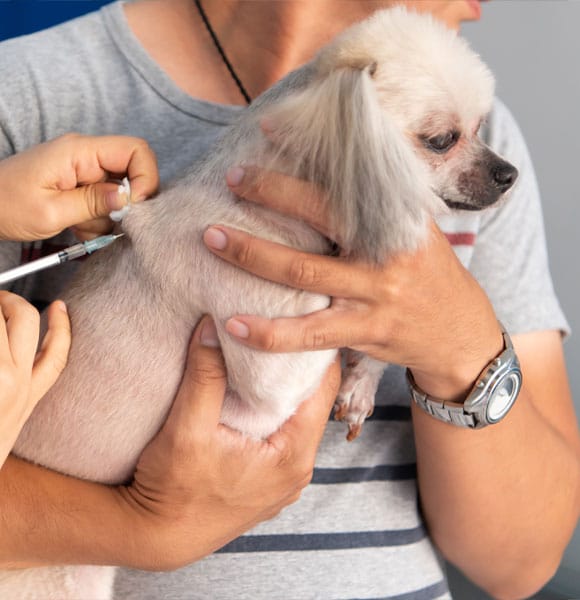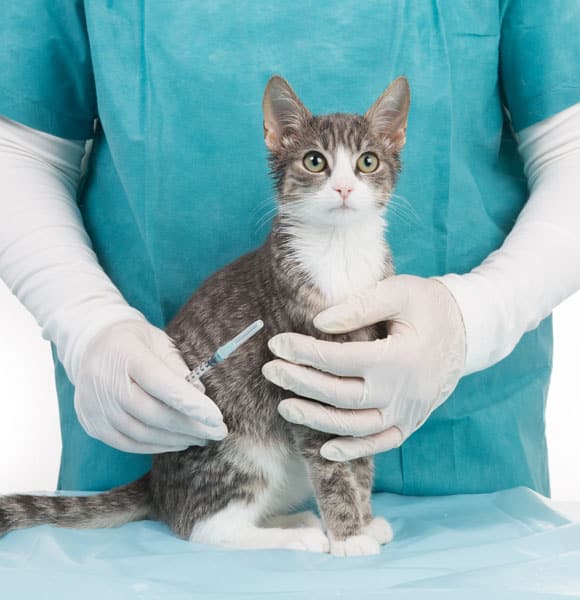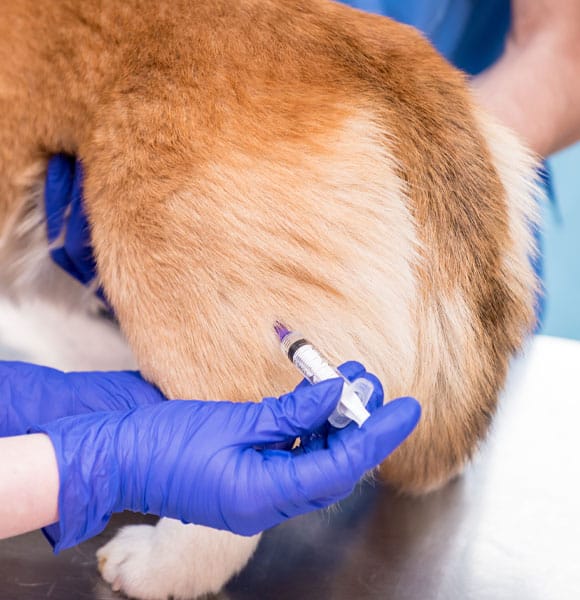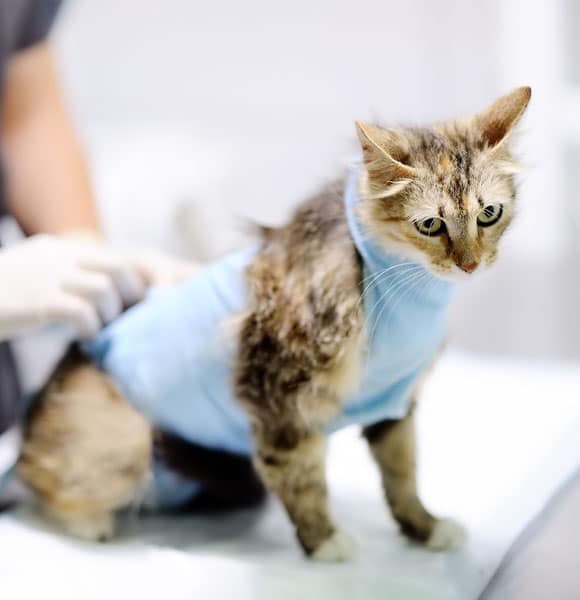Pet Vaccinations in Lake Forest, CA
Pet Vaccinations in Lake Forest, CA
At Bliss Animal Hospital in Lake Forest, CA, we believe preventive care is the foundation of lifelong wellness for your pet. One of the most critical components of preventive veterinary medicine is vaccination. Vaccines help protect pets from contagious, sometimes deadly diseases and significantly reduce the risk of outbreaks in the local pet population. Whether you’re welcoming a new puppy or kitten, or updating an adult pet’s vaccination record, our experienced team tailors every vaccine protocol to your pet’s specific lifestyle, health history, and risk exposure in Lake Forest.


Why Are Vaccinations So Important for Pets?
Vaccines are more than just routine care—they are a vital health investment. Here’s why:
- Disease Prevention: Vaccines help protect your pet from highly contagious, potentially fatal diseases such as parvovirus, distemper, rabies, and feline leukemia. These illnesses can cause long-term complications—or even death—especially in young, unvaccinated pets.
- Zoonotic Disease Control: Certain pet-borne diseases (like leptospirosis and rabies) can spread to humans. By vaccinating your pet, you’re also protecting your family and your community.
- Legal Compliance: In California, rabies vaccinations are legally required for all dogs over 4 months of age. Some municipalities (including parts of Orange County) also require rabies vaccines for cats.
- Environmental Protection: Lake Forest is surrounded by parks, trails, and residential wildlife. Pets that go outdoors—or even come into contact with contaminated soil or puddles—are at increased risk for exposure to bacteria and viruses.
- Socialization & Boarding Requirements: Dog daycares, groomers, training programs, and boarding facilities in Lake Forest all require up-to-date vaccinations. Keeping your pet current ensures they’re never turned away from care or fun activities.
Dog Vaccinations in Lake Forest, CA
Common Dog Diseases That Vaccines Prevent
| Disease | Details & Symptoms |
|---|---|
| Canine Parvovirus | Canine Parvovirus Attacks the gastrointestinal tract; symptoms include bloody diarrhea, vomiting, lethargy, and dehydration. Puppies are at the highest risk and may die without prompt treatment. |
| Canine Distemper | Canine Distemper A multi-systemic viral disease affecting the lungs, stomach, and nervous system. Often fatal or results in lifelong neurological damage. |
| Leptospirosis | Bacterial infection spread through wildlife urine in standing water or soil. Zoonotic—can infect humans. Can cause kidney and liver failure. |
| Bordetella bronchiseptica | Bordetella bronchiseptica Common cause of kennel cough. Transmitted through coughing or shared airspaces. Symptoms include a harsh cough, nasal discharge, and gagging. |
| Canine Influenza | Highly contagious virus causing coughing, fever, and fatigue. May spread rapidly in social or boarding environments. |
| Rabies | Rabies A fatal viral disease affecting the nervous system, transmittable to humans. California law mandates rabies vaccination for dogs. |
Core vs. Non-Core Vaccines for Dogs
Vaccines for dogs are categorized as either core or non-core based on disease severity, transmission risk, and likelihood of exposure.
- Core vaccines are strongly recommended for all dogs, regardless of lifestyle, age, or environment—unless there’s a specific medical reason not to vaccinate. These vaccines protect against life-threatening diseases with high rates of transmission and public health implications.
- Non-core vaccines are administered based on individual risk factors, such as your dog’s lifestyle (e.g., boarding, grooming, hiking), geographic location, or exposure to wildlife and other animals. While not required for every dog, these vaccines are important for many active pets in Lake Forest and surrounding areas.

Core Vaccines (Recommended for ALL dogs)
| Vaccine | Purpose | Frequency |
|---|---|---|
| DHPP | Protects against Distemper, Hepatitis (Adenovirus), Parvovirus, and Parainfluenza | Puppy series + 1-year booster, then every 3 years |
| Rabies | Legally required, prevents fatal virus transmittable to humans | 1-year or 3-year vaccine, depending on previous vaccination history |
Non-Core Vaccines (Recommended based on lifestyle)
| Vaccine | Ideal For | Why It Matters |
|---|---|---|
| Leptospirosis | Dogs near standing water, hiking trails, or wildlife | Protects against a zoonotic bacteria found in Lake Forest parks |
| Bordetella (Kennel Cough) | Social dogs (grooming, daycare, boarding) | Prevents respiratory infections commonly spread in group settings |
| Canine Influenza | Dogs who travel or attend group events | Protects against flu outbreaks in kennels and shelters |
| Lyme Disease | Dogs who travel to tick-heavy areas | Less common in Lake Forest, but relevant for campers/travelers |
For more information, please visit the American Animal Hospital Association (AAHA) Canine vaccination guidelines.
Cat Vaccinations in Lake Forest, CA
Common Cat Diseases That Vaccines Prevent
| Disease | Details & Symptoms |
|---|---|
| Details & Symptoms | Highly contagious and often fatal. Causes fever, vomiting, diarrhea, and immune suppression. |
| Feline Viral Rhinotracheitis & Calicivirus | Causes severe upper respiratory symptoms, including sneezing, nasal discharge, mouth ulcers, and eye inflammation. |
| Feline Leukemia Virus (FeLV) | Suppresses the immune system and increases cancer risk. Especially common in multi-cat homes or outdoor cats. |
| Rabies | Fatal neurological virus. Outdoor cats are especially at risk and may be legally required to be vaccinated in some areas. |

Core vs. Non-Core Vaccines for Cats
Core pet vaccines are recommended for all cats due to the severity of the diseases they prevent. Non-core pet vaccines are recommended based on factors such as lifestyle, environment, and individual risk factors.
Core Vaccines for Cats
| Vaccine | Purpose | Frequency |
|---|---|---|
| FVRCP | Combines protection against Feline Viral Rhinotracheitis, Calicivirus, and Panleukopenia | Kitten series + booster at 1 year, then every 3 years |
| Rabies | Strongly recommended, sometimes required | Typically every 1–3 years, depending on vaccine type |
Non-Core Vaccines for Cats
| Vaccine | Ideal For | Why It Matters |
|---|---|---|
| Feline Leukemia (FeLV) | Outdoor cats or multi-cat homes | Common in feral populations; prevents a fatal immune virus |
| Chlamydia felis | Shelter or group-housed cats | Helps prevent conjunctivitis and respiratory infection |
| Bordetella | Rarely used, only in high-risk feline environments | Prevents respiratory illness in crowded or high-turnover shelters |
For more information, please visit the American Association of Feline Practitioners (AAFP)
Top 10 Pet Vaccination FAQs
Schedule Your Pet’s Vaccination Appointment in Lake Forest, CA
Protect your pet’s health today with our expert vaccine services in Lake Forest.
Call us at (949) 354-5201 or Book Online Now.
Meet Our Veterinarians
The blissful faces behind the care
Driven by compassion and purpose, here is the team who will work to make a difference in your pet’s life. Every single visit.


What your neighbors are saying!
Areas we Serve at Bliss Animal Hospital:
“Better Care. Better medicine.” This is our motto, and our veterinary staff stands behind it.
Bliss Animal Hospital is conveniently located at the Home Depot Plaza in Foothill Ranch, less than a 10-minute drive from the neighborhoods of Lake Forest, Rancho Santa Margarita, Mission Viejo, and Irvine (Great Park and Portola Springs). We also serve more distant regions like Tustin, Coto de Caza, Las Flores, Ladera Ranch, Laguna Hills, Laguna Woods, Stonegate (Irvine), Woodbury (Irvine), and Cypress Village (Irvine).
Our vet hospital is ready to serve not only the communities of South Orange County but also anyone who truly believes that veterinary medicine starts with relationships.



